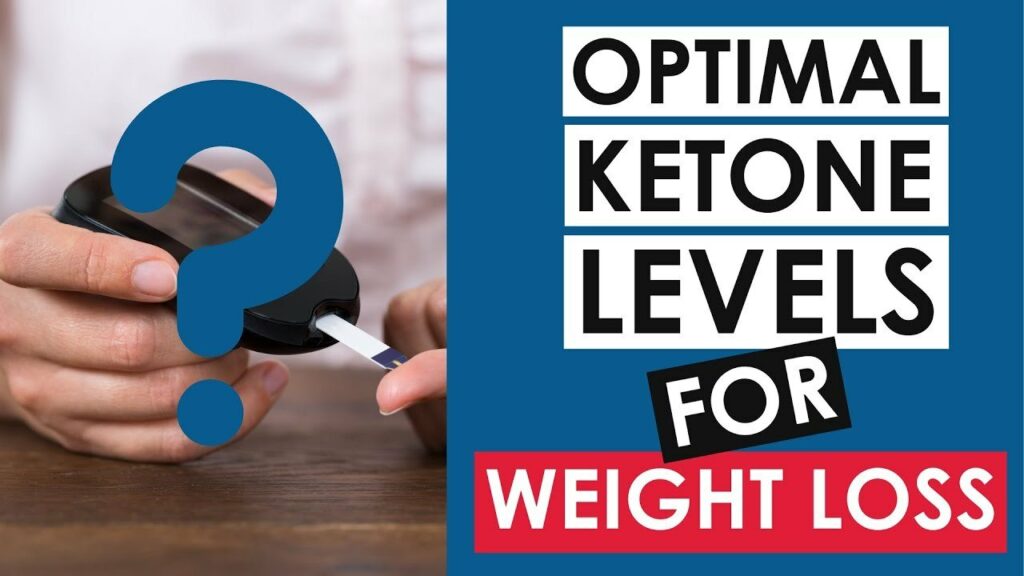If you’ve been searching for an effective way to lose weight, you may have stumbled upon the idea of ketosis. Ketosis is a metabolic state in which your body uses fat instead of carbohydrates as its primary source of energy. But what is the ideal ketosis level for weight loss? In this blog post, we’ll explore the answer to this question and discuss ways to measure and maintain your ideal ketosis level for optimum weight loss results. So, if you’re ready to get started on your keto journey, read on!
Contents
What is Ketosis?

Ketosis is a metabolic state in which the body breaks down stored fat to produce energy. When this happens, ketone bodies are produced from fat and used as fuel by the body’s cells. In contrast to glucose, which is typically burned for energy immediately after eating, ketones can be used for energy at any time, even when there is no food available.
The ketogenic diet is a low-carb, high-fat diet that causes the body to enter into a state of ketosis. This type of diet has been used for centuries to treat various medical conditions and can be beneficial in weight loss and management. By eating fewer carbohydrates and more fats, the body can break down stored fats rather than using its main source of energy—glucose.
Ketosis has many potential benefits, such as improved mental clarity and focus, increased energy levels, improved cholesterol levels, decreased blood sugar levels, weight loss, increased fat-burning capacity, reduced inflammation markers, and even an improved immune system response. However, it is important to note that not everyone responds positively to the ketogenic diet; some people may experience unpleasant side effects such as nausea, headaches, and fatigue. It is important to consult with a dietitian or doctor before starting any new type of diet to ensure that it is right for you.
Ketosis Level For Weight Loss

Weight loss is one of the main reasons that people turn to the ketogenic diet. When your body is in a state of ketosis, it is burning fat for energy instead of carbohydrates. This can lead to increased weight loss over time as the body burns more calories than it consumes and begins to use stored fat for energy.
The ketogenic state can be achieved by following a high-fat, low-carbohydrate diet. When you cut back on carbs, your body enters a natural metabolic state called ketosis which encourages the body to use fat for fuel instead of glucose from carbohydrates. This is beneficial for weight loss because it helps your body burn more calories and stored fat than it would if you were consuming a higher carbohydrate diet.
To maximize the potential weight loss benefits of the ketogenic diet, it’s important to monitor your levels of ketosis regularly. Testing your levels through urine or blood tests can help you determine how well you are doing on the diet and make adjustments as needed.
Ideal Ketosis Level For Weight Loss
The ideal ketosis level for weight loss is 0.5 to 3.0 mmol/L. This range of ketosis levels allows your body to burn fat efficiently while still providing enough energy for daily activities. When your body is in a state of ketosis, it can break down stored fat into ketones, which are then used for energy. The higher your ketone levels, the more efficient your body becomes at burning fat.
The best way to achieve this level of ketosis is through a low-carbohydrate diet, intermittent fasting, and exercise. By reducing the number of carbohydrates you eat and increasing your fat consumption, you can increase your body’s production of ketones and reach optimal levels for weight loss. Additionally, intermittent fasting helps speed up the process by allowing your body more time to enter a state of ketosis. Lastly, regular exercise helps raise your metabolism which will help you burn fat faster.
Once you have reached an ideal ketosis level for weight loss, it’s important to maintain the proper balance to continue losing weight at a healthy rate. If your levels become too high or too low, then it could lead to problems such as muscle loss, dehydration, or fatigue. It’s also important to remember that you should consult with a doctor before making any major changes to your diet and lifestyle.
How To Maintain Ideal Ketosis Level For Weight Loss?

There are several ways to maintain ideal ketosis levels for weight loss.
Follow a Ketogenic Diet
A well-formulated ketogenic diet is the most important factor in maintaining an optimal level of ketosis for weight loss. The macronutrient ratios of a typical keto diet should be 70–80% fat, 10–20% protein, and 5–10% carbohydrates. Additionally, it’s important to consume foods that are high in healthy fats such as avocados, nuts, seeds, and fatty fish like salmon.
Exercise Consistently
Exercise can help you increase your body’s ability to burn fat which can aid in maintaining a state of ketosis. High-intensity interval training (HIIT) is especially effective when it comes to using fat for energy. These types of workouts also increase your metabolic rate, making it easier to burn more calories after the workout is over.
Try Intermittent Fasting
Intermittent fasting can also be used to maintain ketosis. This involves avoiding eating for some time (usually 16-24 hours) and then breaking the fast with a healthy meal that fits into your keto diet plan. During periods of intermittent fasting, your body will use stored fat as its primary fuel source instead of carbohydrates, helping you stay in ketosis.
Test Ketone Levels Regularly
Testing your blood ketone levels regularly is an important factor in maintaining ideal ketosis levels for weight loss. You can test using urine strips or a hand-held device called a ketone meter to ensure that you are in the desired range. To test your blood ketone levels, you will need to use a ketone meter and a small drop of blood.
Stay Hydrated
Staying hydrated is essential for maintaining an ideal level of ketosis for weight loss. Drinking plenty of water helps your body metabolize fat more efficiently. Aim to drink at least 8 glasses of water each day to ensure proper hydration. Additionally, electrolyte supplements can help replace key minerals lost through increased urination on a low-carb diet.
Get Enough Sleep
Getting enough sleep is also important for achieving and maintaining optimal ketosis levels. Sleep deprivation leads to higher cortisol levels which can cause the body to store excess fat instead of using it for energy. Shoot for 7-8 hours of quality sleep each night to ensure your body can burn fat efficiently.
Track Your Food Intake
Tracking your food intake can help you stay accountable and maintain the proper macronutrient ratios necessary for ketosis. There are several applications available that make tracking easy and provide helpful feedback on how close you are to achieving a state of ketosis. These tools can also help you monitor your progress and make adjustments to ensure you stay in ketosis.
Monitor Ketones
Monitoring your ketone levels is the best way to determine if you’re in a state of ketosis or not. You can do this by using either urine strips, breath meters, or blood testing devices. It’s important to note that urine strips may not be as accurate as the other two methods, but they are the cheapest and most convenient.
By following these simple tips, you can maintain an ideal level of ketosis for weight loss and maximize the effectiveness of your diet plan.
Benefits of Ideal Ketosis Level For Weight Loss

When your body is in ketosis, it is burning fat for energy instead of carbohydrates. This has a few advantages when it comes to weight loss:
Helps To Stabilize Blood Sugar: Keeping your blood sugar stable is the key to maintaining a healthy weight. When your body is in ketosis, it helps to keep your blood sugar from spiking and crashing, which can lead to overeating and cravings.
Reduces Appetite: Going into ketosis suppresses appetite, which helps you reduce calorie intake naturally. This means that when trying to lose weight, you’re more likely to stick with a diet plan and not turn to unhealthy snacks or junk food.
Increases Metabolism: Being in ketosis increases the rate of fat burning, so you burn more calories even when resting. This results in faster weight loss without having to do any extra exercise or cut down on calorie intake significantly.
Builds Muscle: When in ketosis, your body can use fat for energy and this helps to preserve muscle mass. This is helpful if you’re trying to lose weight without losing muscle, which can happen if you just cut down on calories without exercising.
Boosts Energy: Burning fat for energy gives you more sustained energy throughout the day instead of quick bursts of energy that fade quickly when eating carbohydrates. This means you have more fuel for workouts and activities so you can stay active and keep burning calories even after exercise.
Overall, reaching an ideal ketosis level can help with weight loss by stabilizing blood sugar, reducing appetite, increasing metabolism, building muscle, and boosting energy levels.
Conclusion
Achieving ideal ketosis levels for weight loss can be difficult, but with the right diet and lifestyle, it is achievable. Keeping an eye on your ketone levels will help you track progress and adjust your diet and lifestyle accordingly. By understanding what level of ketosis is best for weight loss, as well as how to get there safely and sustainably, you can maximize the effectiveness of a low-carbohydrate diet while minimizing the risks associated with high blood glucose levels. With these tips in mind, you’ll be able to find success on your journey toward achieving ideal ketosis levels for lasting weight loss results.
Consider contacting FitMantra for additional information on nutrition and fitness. You can also get in touch with their nutrition experts through our online nutrition counseling, who can guide you through the process and help you achieve your fitness goals. You can also lose weight with the help of our weight loss program. Download our Fitness app on Android to learn more about us.
